What Happens If You Don’t Maintain Your Forklift Battery?
Forklifts play an essential role across industries such as manufacturing, warehousing, retail, transportation, and construction. Their efficiency and reliability depend heavily on the condition of the power source. One of the most overlooked but critical components is the forklift battery.
Proper forklift battery maintenance extends the forklift battery lifespan, improves safety, lowers operating costs, and keeps operations running smoothly. This article explains the consequences of poor maintenance, the risks involved, and practical steps to keep your forklift batteries in excellent condition.
Understanding Forklift Batteries
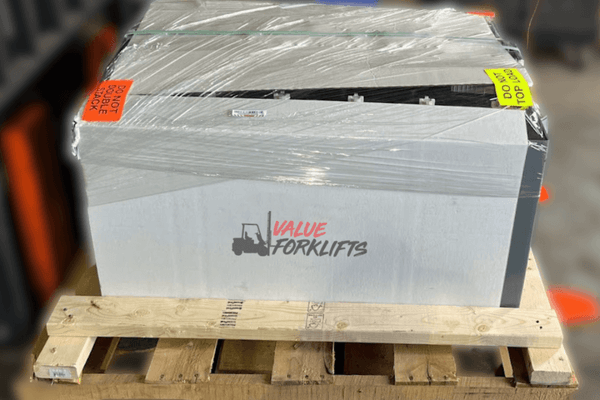
Forklift batteries are the backbone of electric-powered forklifts, enabling them to operate efficiently without emissions. Unlike regular vehicle batteries, industrial forklift batteries are designed for heavy-duty use, powering both the traction (movement) and hydraulic systems. Without proper electric forklift battery maintenance, poor care creates forklift battery problems that result in costly disruptions and safety issues.
Types of Forklift Batteries
- Lead-acid batteries: These traditional batteries are widely used in many industries. They require consistent watering and charging. Their forklift battery lifespan typically ranges from 1,500–2,000 cycles with proper forklift battery maintenance. Ignoring these needs often causes forklift battery problems such as sulfation and reduced charge capacity.
- Lithium-ion batteries: These modern batteries require less upkeep and last longer. Although they come with higher initial costs, they reduce maintenance expenses and avoid many of the forklift battery problems linked to lead-acid models.
Neglecting either type leads to reduced performance, higher replacement costs, and more downtime.
Key Components of a Forklift Battery
A forklift battery consists of several important parts:
- Cells: These generate electrical power. Without regular forklift battery maintenance, cells lose balance and reduce output, creating forklift battery problems.
- Terminals: These connect the battery to the forklift. Corrosion builds up without cleaning, causing resistance and forklift battery problems.
- Electrolyte solution: Vital for charge and discharge cycles. Low levels expose plates and shorten forklift battery lifespan, leading to preventable problems.
- Plates: These store and release energy. Without proper charging, plates suffer sulfation or corrosion, reducing performance and causing costly forklift battery problems.
Each part requires consistent forklift battery maintenance to prevent failures.
Reduced Lifespan & Performance from Poor Maintenance
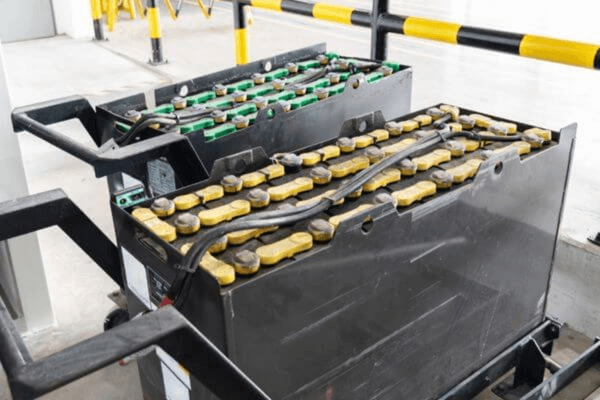
When forklift battery maintenance is ignored, the outcome is clear: a shorter lifespan, poor efficiency, and eventual failure. Batteries that could last five years may only last half that time, forcing businesses to buy replacements sooner.
Shorter Lifespan
Neglected batteries fail much earlier. Instead of completing 1,500+ charging cycles, improper charging, lack of watering, and repeated deep discharges reduce forklift battery lifespan and increase replacement costs.
Lower Efficiency
A neglected battery does not hold its charge well, cutting runtime and shortening forklift battery lifespan. Forklifts need recharging more often, interrupting workflow. For operations with multiple shifts, this loss in efficiency reduces productivity and leads to higher forklift battery replacement costs if early failure occurs.
Deep Discharge Damage
Allowing a battery to discharge below 20% repeatedly creates serious forklift battery problems. Overheating, strained motors, and a shortened forklift battery lifespan are the results. Over time, this misuse reduces efficiency and damages equipment.
Increased Costs of Neglecting Forklift Battery Maintenance
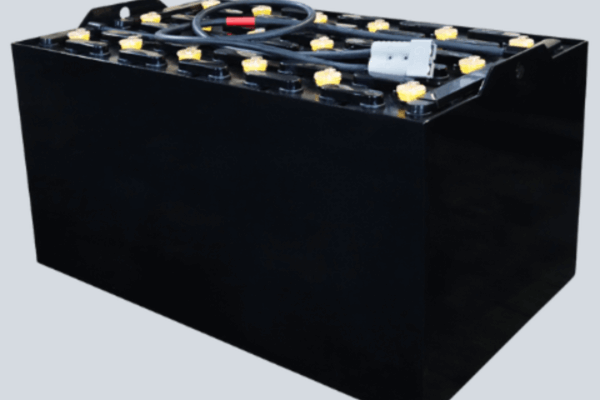
Poor care drives up costs in obvious ways. Regular forklift battery maintenance may require some effort, but it saves large amounts in the long run.
Costly Replacements
High-quality forklift batteries are expensive. Replacing them sooner than necessary puts heavy pressure on budgets. Simple steps like watering and correct charging significantly reduce forklift battery replacement costs.
Higher Energy Costs
Poorly maintained batteries consume extra energy during recharging, creating forklift battery problems. Damaged cells pull excessive current, wasting power and reducing forklift battery lifespan. Without consistent forklift battery maintenance, energy bills climb, especially in large fleets.
Safety Hazards
Poor maintenance also introduces serious safety concerns. A neglected battery can become a hazard for workers and facilities.
Fire and Explosions
Forklift batteries, particularly industrial forklift batteries, release hydrogen and oxygen gases during charging. When forklift battery maintenance is ignored, gas buildup increases the chance of fire or explosion. Overheating caused by deep discharges or poor charging also creates dangerous conditions.
Chemical Exposure
Lead-acid forklift batteries contain sulfuric acid. If the battery is damaged or poorly watered, leaks can occur. These are dangerous forklift battery problems, putting workers at risk of burns, respiratory issues, and eye injuries. Routine forklift battery maintenance and safe handling reduce these risks.
Damage to Equipment

Failing to maintain forklift batteries harms more than just the battery. It damages the forklift itself.
Electrical Component Damage
Frequent deep discharges strain traction motors and hydraulic systems, creating forklift battery problems. Without proper electric forklift battery maintenance, overheating damages costly components and shortens forklift battery lifespan.
Corrosion
Electrolyte spills or gas release cause corrosion on terminals and connectors. This common forklift battery problem creates resistance, short circuits, and reduced capacity. Without forklift battery maintenance, corrosion shortens forklift battery lifespan and requires expensive repairs.
Sulfation
In lead-acid batteries, failure to fully charge leads to sulfation. This buildup of lead sulfate crystals lowers capacity, shortens forklift battery lifespan, and can make the battery unusable without forklift battery maintenance.
Signs Your Forklift Battery Needs Maintenance
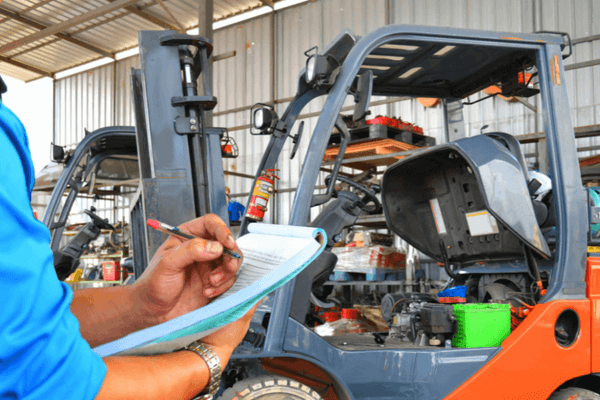
Recognizing early warning signs prevents bigger failures. Monitoring a forklift battery closely avoids breakdowns.
Physical Symptoms
- Corrosion on terminals or connectors: A common forklift battery problem that disrupts power flow without regular forklift battery maintenance.
- Leaking electrolyte: Acid leaks damage equipment and show poor forklift battery maintenance.
- Swelling or bulging battery casing: A visible forklift battery problem caused by neglect, avoidable with regular forklift battery maintenance.
- Strong sulfur odor: This odor signals leaks or overcharging, emphasizing the need for forklift battery maintenance.
Performance Indicators
- Reduced runtime between charges: A clear sign of forklift battery problems, usually from poor electric forklift battery maintenance that shortens forklift battery lifespan.
- Inconsistent power delivery: Power fluctuations point to forklift battery problems and a compromised lifespan.
- Frequent need for recharging: When charging becomes constant, the forklift battery's lifespan is deteriorating, often from poor maintenance.
Electrical Signs
- Sudden voltage drops: An indication of forklift battery problems from neglecting electric forklift battery maintenance, reducing the lifespan.
- Prolonged charging times: Slow charging signals forklift battery problems that can be corrected with proper maintenance to protect the lifespan.
- Error codes on dashboards: Frequent error codes reveal forklift battery problems and the need for electric forklift battery maintenance to prevent a shorter lifespan.
Spotting these early keeps forklifts running longer and protects the forklift battery lifespan.
How to Maintain a Forklift Battery
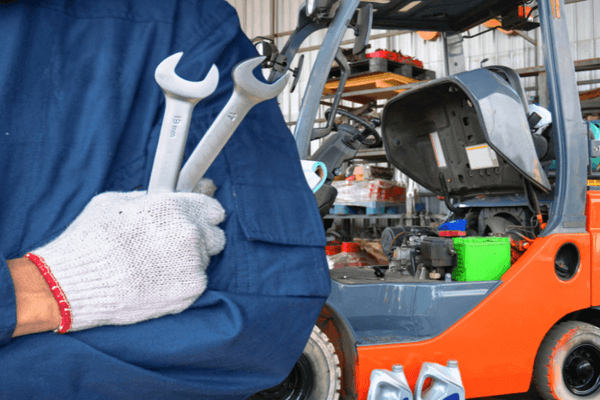
Good maintenance ensures batteries last, work efficiently, and remain safe. Key steps include:
Regular Inspection & Cleaning
Check terminals for corrosion, electrolyte levels, and casing condition. Cleaning with a neutralizing solution stops buildup and ensures reliable electrical flow.
Proper Charging Practices
Do not allow deep discharges or opportunity charging. Follow the manufacturer's charging cycles. Lead-acid batteries should be charged at 20–30% capacity. Lithium-ion models need fewer strict cycles but still require proper handling.
Watering Your Forklift Battery
Lead-acid batteries need weekly water checks. Top off only after charging to avoid overflow, and always use distilled water.
Equalization
Equalize every 5–10 cycles for lead-acid batteries. This prevents stratification and reduces sulfation.
Safe Storage and Handling
Keep batteries in cool, dry locations away from sunlight. Avoid deep discharges and always use protective equipment when handling.
Developing a Maintenance Schedule
A consistent routine ensures batteries get the care they need. Document inspections, watering, and charging to extend forklift battery lifespan and control replacement costs.
How Value Forklifts Helps You Keep Forklifts Running Efficiently
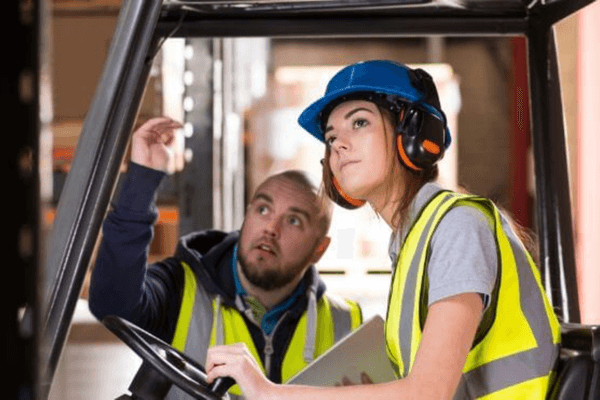
At Value Forklifts, reliable equipment is our focus. With more than 30 years of experience, we help businesses choose the right forklifts for their operations.
- Wide Inventory: Our selection of fully serviced electric and propane forklifts comes equipped with dependable batteries and chargers to keep operations moving.
- Expert Guidance: We provide practical advice on forklift battery maintenance and electric forklift battery maintenance so your equipment remains efficient and safe.
- Long-Term Value: With proven best practices, we help extend forklift battery lifespan, reduce downtime, and improve productivity.
Working with Value Forklifts gives you a trusted resource to keep your fleet cost-effective, efficient, and reliable for the long term.
Conclusion
Consistent forklift battery maintenance is essential for extending forklift battery lifespan, reducing replacement costs, and keeping workplaces safe. Neglecting maintenance results in forklift battery problems, higher energy costs, equipment damage, and safety risks.
A strong routine of inspections, charging discipline, watering, and safe storage maximizes productivity and protects investments. Proactive care ensures batteries remain dependable, safeguards workers, and maintains operational efficiency.
Partner with Value Forklifts today for expert support with forklift battery maintenance and dependable equipment. Contact us now to keep your forklifts running at their best for years to come.
Frequently Asked Questions
How many years does a forklift battery last?
A standard forklift battery lifespan ranges from 5–7 years with proper maintenance. Lithium-ion batteries may last longer, while neglected lead-acid batteries may fail in just 2–3 years.
How often do forklift batteries need to be watered?
Lead-acid batteries should be watered weekly, depending on usage. Always check levels after charging and top off with distilled water.
How often should I equalize a forklift battery?
Equalization should be performed every 5–10 charging cycles for lead-acid batteries. This prevents sulfation and ensures balanced charging.
Dangers of Not Maintaining Forklift Batteries
Neglecting forklift battery maintenance raises replacement costs, creates safety risks such as fires and acid leaks, and reduces efficiency. The long-term risks far outweigh the effort of proper care.
